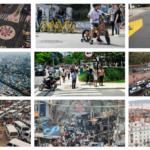Search Results
At the annual Transforming Transportation conference this month, WRI Ross Center for Sustainable Cities launched the new Vision Zero Challenge, an initiative to end road deaths by a coalition of global and local partners. Zoleka Mandela, who spoke at the ...

At the start of this new decade, American cities, states and businesses have already come a long way on the road to cutting greenhouse gas emissions to help tackle the climate crisis: 155 cities have committed to 100% community-wide renewable energy; ...

Getting to a net-zero-carbon energy system is essential. It will be a major effort, one that requires significant investment in new low-carbon infrastructure, from renewable power plants to electric vehicles, efficient appliances and better constructed buildings. While very few countries are on track, China, Costa ...

Fueled by billions of dollars of venture capital funding, micromobility is making its mark on cities across the globe. In the United States, more than 45 million trips were made on shared electric bikes and electric scooters in 2018. Shared ...

The world was not kind to the environment over the past decade, the warmest in recorded history. Superstorm Sandy caused more than $70 billion of damages in the United States. Cities like Cape Town, South Africa, nearly ran out of water. Record floods killed ...

“All the things we want to do [in transport] are good for the climate. The question is how do we get there? How can transport be the champion?” said Ani Dasgupta, global director of WRI Ross Center, on the final ...

Transforming Transportation 2020 kicked off today at the World Bank in Washington, DC. A wide range of policymakers, business leaders, development practitioners, experts and advocates raised the challenges faced by countries worldwide in providing sustainable mobility for all. Panels covered ...

Vision Zero has become a familiar term in urban mobility planning and road safety around the world. After starting in Sweden in the 1990s and being applied in Europe and the UK, the road safety strategy has recently increased in ...

“Cities are special,” Luis Bettencourt says in an interview for the Cities Research Seminar Series, but they may only be beginning to tap into their full potential. We need to think about cities more as “collective systems that have their ...

In Pasig City, Philippines, southeast of Manila, there’s an apartment complex with whitewashed walls and colorful trim. It’s an unassuming set of buildings, but a globally important one. The Manggahan Low Rise Building Project is a climate-resilient building, meant to ...

Cities are hotspots for global innovation and transformative change, from restoring urban vitality through street design to enhancing access through data-driven solutions. In 2019, we watched as cities took on these challenges, leading the charge into a new decade. Our ...

In the urban neighborhood known as Kosovo Village in Nairobi, Kenya, 95% of residents defecate in communal or shared facilities where untreated human waste drains directly into a nearby river. During a storm, fetid and polluted waters flood the riverbanks, ...

Among cities with the highest rates of outward expansion are coastal cities that are extremely vulnerable to flooding from sea level rise and storm surges. Map by Resource Watch Urban expansion and sea level rise are combining to increase the ...

When Hurricane Katrina hit New Orleans 14 years ago, hundreds of thousands of people lost their jobs, homes and possessions. But some people were hit harder than others. Nearly two-thirds of jobs lost after the hurricane were lost by women, and ...

This commentary explores the social and economic benefits that climate action can deliver and uses real world examples to show how these benefits can be used to further equity and ensure a just transition to a new climate economy. In ...

Page 28 of 228« First...1020...272829...4050...Last »






















